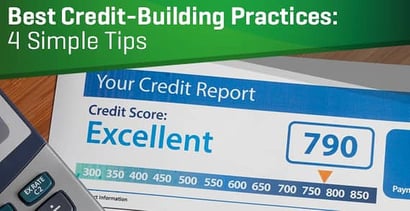

When building credit, everyone has to start somewhere. The challenge is that in order to get credit, you need to already have established credit, which you can’t get because you don’t have it. This puts beginners at a disadvantage—but it doesn’t have to be that way.
A few simple tricks can help anyone build credit with ease. Our financial experts have compiled together the best credit-building practices recommended for people with low or no credit.
Select the Right Card to Help You Establish Good Credit
Certain cards are better suited to people with limited credit. The following different credit-building opportunities offer diverse benefits for the owner.
- Student Cards: For those still in school, student credit cards will establish credit and reward fiscal responsibility. These cards usually require a co-signer (yes, you can ask your parents).
- Store Cards: If you aren’t approved for many credit cards, a department store card for a store you shop at frequently is a good option. These cards are easier to get but can come with high interest rates.
- Secured Cards: Requiring a security deposit in order to “secure” a line of credit, secured cards are best for people with poor credit history. These cards provide a chance to rebuild credit and earn your way toward an unsecured credit card.
Timely Payments Go a Long Way Toward Building Credit
Paying bills on time is a straightforward way to earn credit. This may seem obvious, but paying on time is absolutely essential to establishing and maintaining solid credit. Missed payments (even just one) will hurt your credit. A pattern of timely payments is a major component in determining your FICO credit score.

FICO estimates that 35% of your FICO credit score comes down to your payment history.
Make on-time payments every month, and you’ll soon see positive increases in your credit score. This will open you up to a world of benefits and rewards.
Use Only a Portion of Your Credit Limit, Never Maxing Out
For a first credit card, don’t expect very high credit limits. Typically, you’ll be given a rather short financial leash until you prove your trustworthiness as a borrower.
To show yourself to be a reliable and risk-averse spender, you’ll need to strike a balance between using your credit card without overusing it. That means not reaching (or even getting close to) the credit card limit.
Avoid maxing out your credit card by budgeting your spending. The best practice with any credit card is to keep your balance below 30 percent of your credit limit. For example, a credit card with a $1,000 credit limit should never exceed a $300 balance.
The Fewer Credit Cards You Apply for, the Better Your Credit
Every time you apply for credit, you’ll see a slight dip in your credit score that results from the issuer pulling up your credit history. Such a decrease is minimal for a one-time occurrence but can add up if you apply for multiple cards, especially if your credit score is already low.
An easy way to lessen this negative impact: apply for fewer credit cards.
If you already have a slew of credit cards open to you, though, go ahead and maximize your available credit. Keeping accounts open doesn’t do any harm, unless you’re paying a steep annual fee. In fact, keeping your oldest accounts open helps your credit by improving your length of credit history. You don’t need to close your old credit cards, but do be picky about what credit opportunities you take on in the first place.
Final Thoughts
When building credit, these simple guidelines will get you off on the right foot. Acting fiscally responsible means choosing a credit card that meets your needs, making timely payments on that card, carefully budgeting beneath your credit limit, and only applying for one card at a time. With these tips, you’ll be on your way to excellent credit!
Advertiser Disclosure
BadCredit.org is a free online resource that offers valuable content and comparison services to users. To keep this resource 100% free for users, we receive advertising compensation from the financial products listed on this page. Along with key review factors, this compensation may impact how and where products appear on the page (including, for example, the order in which they appear). BadCredit.org does not include listings for all financial products.
Our Editorial Review Policy
Our site is committed to publishing independent, accurate content guided by strict editorial guidelines. Before articles and reviews are published on our site, they undergo a thorough review process performed by a team of independent editors and subject-matter experts to ensure the content’s accuracy, timeliness, and impartiality. Our editorial team is separate and independent of our site’s advertisers, and the opinions they express on our site are their own. To read more about our team members and their editorial backgrounds, please visit our site’s About page.




